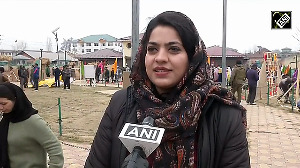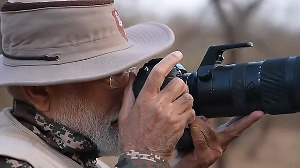Castigating the Pakistani police for its alleged high-handed action against survivors of the October 8 earthquake, a United States-based watchdog group has urged international donors to insist that authorities respect human rights of people already suffering from a natural calamity.
The appeal by Human Rights Watch was especially aimed at donors meeting in Islamabad this Friday to discuss aid for victims, what with winter being just days away.
'Given its record of abuse and corruption, the Pakistani military should not be given carte blanche in relief efforts. To keep the process honest, civil society must be given a significant role both in delivery and oversight', HRW said in a statement on Wednesday.
Expressing concern over the government's intolerance to dissent in Pakistan-occupied Kashmir and attempts to muzzle the press to suppress negative reporting, it claimed that the Pakistan military essentially runs the area as its fiefdom.
Aid should be distributed without regard to political affiliation, HRW said, stressing there should not be any discrimination against 'Kashmiri nationalists' who do not accept Pakistan's control over the region or people who have crossed over to Pakistan-occupied Kashmir from India.
HRW has alleged that these groups faced systematic discrimination and violations of human rights at the hands of the Pakistan army, its security agencies and the local government, purportedly acting at the behest of Islamabad. Besides, officials ban or harass opposition political parties, it said.
In recent weeks, Pakistani military authorities have also discouraged negative media coverage of the nation's response to the earthquake, with President Pervez Musharraf himself having expressed his 'displeasure at excessive criticism' in the press, HRW noted.
"Now is the time for more information about the relief effort, not less," said Brad Adams, Asia director at HRW. "Donors should make it clear to the Pakistani government that attempts to muzzle reporting on relief efforts are unacceptable."
A recent attack by Pakistani police on a camp of survivors highlights why international donors must insist on human rights protection in PoK, HRW said. "The challenges of responding to the earthquake do not give the Pakistani police license to attack quake victims," Adams said.
The police, HRW alleged, used canes and rifle butts on November 11 to break up a march by approximately 200 quake survivors, who were protesting eviction from their makeshift camp in Muzaffarabad.
Though the police denied attempts to forcibly evict them, witnesses told HRW that police arrived early Friday at Jalalabad Garden camp and told survivors to leave by sunset. Several protestors, including children, were injured as a result of police efforts to break up the demonstration.
The authorities subsequently backtracked and only a few refugees have moved from the camp, which is still functional, HRW said. "Homeless people are worried if they are asked to move without assurances that they will have the scarce necessities of life at a new location," Adams said.
On Monday, the government-run electronic media regulatory authority, PEMRA, stopped three local partners of the BBC from broadcasting two daily 30-minute 'earthquake specials' produced by the BBC's Urdu service, HRW claimed.
PEMRA officials, accompanied by dozens of armed policemen, allegedly seized equipment from one of the local partner's Karachi offices and ordered two satellite television partners to stop running news content from BBC. Pakistan's information minister declined to comment, it said.
HRW also called on the international community to ensure there is greater civilian oversight of relief, rehabilitation and reconstruction efforts. So far, there has been little sign of any civilian oversight of aid inflows, it said.
According to HRW, aid should be handled through a process that involves the local government and political parties in PoK as well as national and international non-governmental organisations and civil society groups.
In addition, the watchdog has appealed for independent auditing of relief funds and materials to ensure transparency and accountability. Contracts for reconstruction should be handled through proper procurement procedures that allow bidding by private agencies and not just military entities, it added.






 © 2025
© 2025